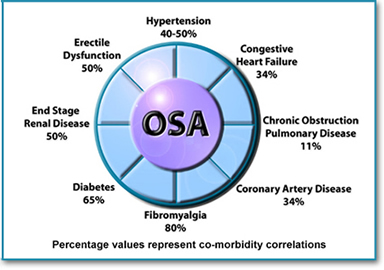Obstructive Sleep Apnoea
What is sleep apnoea?
Obstructive sleep apnoea is a condition where there are repetitive pauses or reductions in breathing during sleep, due to collapse of the upper airway and usually accompanied by reduction in blood oxygen levels and followed by an awakening to breathe resulting in chronic tiredness and fatigue.
How does sleep apnoea occur?
Obstruction of the upper airway occurs when the muscles of the upper airway (including the tongue and soft palate) become relaxed during sleep narrowing significantly, or completely blocking the airway, and preventing breathing.
This leads to snoring and breathing difficulties, and breathing either reduces or stops for more than 10 seconds.
The brain then reacts to the stopped breathing, and alerts the body to wake up or move to a lighter level of sleep. In most cases, the sufferer will be unaware of this.
This can occur several hundred times during the night and may cause broken sleep, causing the sufferer to feel sleepy and lethargic the next day.
What are the risk factors?
- Male or post menopausal female
- Obesity or excessive weight gain, particularly increased neck size or central obesity
- Increasing age
- Family history of snoring or sleep apnoea
- Physical abnormalities of the nose, throat, or other parts of the upper airway
- Smoking and alcohol use
Conditions which make sleep apnoea worse:
- Alcohol, and tobacco use
- Sleeping on your back
- Sleep deprivation and shift work
- Anaesthestic agents
- Sleeping tablets
What are the Symptoms?
- Loud, repetitive snoring
- Choking or gasping during sleep
- Reoccurring awakenings or restless sleep
- Unrefreshing sleep
- Daytime lethargy or somnolence
- Impaired concentration, alertness and memory
- Personality changes or depression
- Nocturia or impotence

Complications of sleep apnoea.
Early recognition and treatment of sleep apnoea is critical because the frequent awakenings and the inability to achieve or maintain the deeper stages of sleep can lead to:
- Higher risk of motor vehicle accidents and occupational accidents
- Disturbance of mood, depression
- Impotence
- Inability to sleep with partner due to snoring and disturbed sleep.
- Increased risk for other medical conditions, including irregular heartbeat, high blood pressure, heart attack, heart failure and stroke.
Diagnosis of sleep apnoea
- If you have these symptoms or suspect that you may have sleep apnoea, a sleep study would be warranted.
- Accurate sleep studies can now be performed at your home at your convenience.
- Please talk to your local doctor in order to organise this.
Treatment is Available
See our Fact Sheet on “Treatment Options for Obstructive Sleep Apnoea”.
Warning—If you are experiencing tiredness or sleepiness during the day, loud snoring or pauses in breathing during sleep or any other sleeping difficulties, please take the Epworth Sleepiness Scale test and discuss these problems with your doctor.